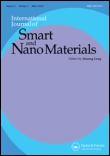
International Journal of Smart and Nano Materials
Scope & Guideline
Exploring the Frontiers of Smart and Nano Materials
Introduction
Aims and Scopes
- Smart Materials Development:
Research on materials that can respond to external stimuli (e.g., temperature, light, electric fields) and exhibit adaptive behaviors, such as shape memory alloys and self-healing materials. - Nanomaterials and Nanotechnology:
Exploration of materials at the nanoscale, including their synthesis, characterization, and applications in various fields such as electronics, biomedicine, and energy. - Advanced Fabrication Techniques:
Innovative methodologies for the fabrication and processing of smart and nano materials, including 3D printing, electrospinning, and advanced lithography. - Interdisciplinary Applications:
Focus on the application of smart and nano materials in diverse fields such as flexible electronics, biomedical devices, environmental remediation, and energy systems. - Mechanical and Structural Performance:
Investigation of the mechanical properties and performance of new materials, including studies on stress, strain, and failure mechanisms.
Trending and Emerging
- Liquid Metal Applications:
There is a growing interest in the application of liquid metals in flexible electronics and energy systems, highlighting their unique properties and potential for innovative uses. - Hydrogels and Biocompatibility:
Research on hydrogels, especially those mimicking biological tissues for medical applications, has gained traction, emphasizing their importance in biomedical engineering. - Integration of Machine Learning:
The integration of machine learning techniques in material design and analysis is emerging as a significant trend, enhancing predictive capabilities and optimizing material performance. - Energy Harvesting Technologies:
The development of energy harvesting devices, particularly those utilizing triboelectric and piezoelectric principles, is increasingly featured, reflecting a focus on sustainability and self-powered systems. - Bioinspired Materials and Structures:
There is a notable trend towards designing materials and structures inspired by biological systems, which offer innovative solutions and enhanced functionalities in various applications.
Declining or Waning
- Traditional Composite Materials:
Research on conventional composite materials has decreased, as the focus shifts towards more advanced smart materials and nanocomposites that offer superior performance. - Static Mechanical Properties:
Studies primarily focused on static mechanical properties without dynamic or smart applications are less frequently published, indicating a trend towards dynamic and responsive material behavior. - Basic Synthesis Methods:
Basic synthesis techniques that do not incorporate innovative or advanced methodologies are becoming less common, as researchers seek novel approaches that enhance material functionality. - Conventional Sensors:
The development and analysis of traditional sensor technologies are waning in favor of more advanced, integrated sensor systems that leverage smart materials and nanotechnology. - Standardized Testing Protocols:
Research centered on conventional testing methods is declining, with a growing emphasis on innovative testing techniques that better evaluate the performance of advanced materials.
Similar Journals
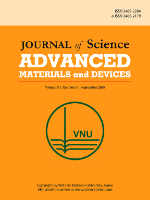
Journal of Science-Advanced Materials and Devices
Connecting Scholars to the Future of Materials ScienceJournal of Science-Advanced Materials and Devices is a leading open-access journal published by Vietnam National University, dedicated to advancing the field of materials science through cutting-edge research and innovative developments. Since its inception in 2016, this journal has become a pivotal platform for sharing insights and discoveries in various subfields, including biomaterials, ceramics and composites, and electronic, optical, and magnetic materials. With impressive quartile rankings, including Q1 across multiple categories in 2023, and a notable Scopus ranking placing it in the top 15th percentile for ceramics and composites, it highlights the journal’s influence and prestige within the global academic community. Open Access since its launch, the journal aims to facilitate unrestricted dissemination of scholarly work, empowering researchers, professionals, and students to engage with the latest advancements. The Journal of Science-Advanced Materials and Devices is vital for those seeking high-quality contributions that influence both theoretical understanding and practical applications in the ever-evolving landscape of materials science.
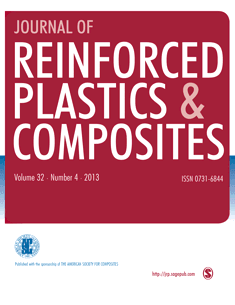
JOURNAL OF REINFORCED PLASTICS AND COMPOSITES
Transforming Ideas into Advanced Engineering SolutionsWelcome to the JOURNAL OF REINFORCED PLASTICS AND COMPOSITES, a leading publication in the realms of materials science, engineering, and polymers. Published by SAGE Publications Ltd, this journal stands out with its robust Q2 ranking in multiple categories, including Ceramics and Composites, Materials Chemistry, Mechanical Engineering, and Mechanics of Materials. Since its inception in 1982, the journal has become an essential resource for researchers and professionals, disseminating pioneering research and innovative applications in reinforced plastics and composite materials. Though not open access, subscribers gain exclusive insights into groundbreaking findings contributing to the advancement of the industry. The journal is indexed in Scopus, with notable rankings that reflect its influence and high-quality scholarship. With ongoing coverage until 2024, the JOURNAL OF REINFORCED PLASTICS AND COMPOSITES remains committed to fostering academic dialogues and facilitating advancements in sustainable materials and advanced engineering solutions.

Journal of Metals Materials and Minerals
Elevating the Discourse in Metallurgy and Material ApplicationsJournal of Metals Materials and Minerals (ISSN: 0857-6149) is a renowned academic publication dedicated to the interdisciplinary fields of metallurgical science, materials engineering, and mineralogy. Published by Chulalongkorn University, Metallurgy & Materials Science Research Institute in Thailand, this journal serves as a pivotal platform for researchers to disseminate their findings and explore innovative applications related to metals, ceramics, polymers, and biomaterials. Although the journal does not currently adopt an open-access model, it provides insightful content that facilitates knowledge sharing among professionals and academics alike. The journal has established its credibility with impressive Scopus ranking percentiles, particularly in categories such as Metals and Alloys and Ceramics and Composites. With an emphasis on advancing the understanding of materials science from 2017 to 2024, the Journal of Metals Materials and Minerals remains an essential resource for those striving to contribute to and stay informed about the latest trends and breakthroughs in these dynamic fields.

Nanoscience and Technology-An International Journal
Innovating Tomorrow's Materials TodayNanoscience and Technology-An International Journal, published by BEGELL HOUSE INC, is a leading platform dedicated to the rapidly evolving fields of nanoscience and nanotechnology. With its ISSN 2572-4258 and E-ISSN 2572-4266, the journal serves as a crucial resource for researchers, professionals, and students alike, focusing on advanced materials, condensed matter physics, and mechanics of materials. It holds a commendable position in the scholarly community, evidenced by its Q2 ranking in 2023 across multiple categories including Condensed Matter Physics and Materials Science. The journal aims to disseminate high-quality research, promote interdisciplinary collaboration, and facilitate innovation within the nano realm. With its convergence period from 2019 to 2024, it continues to attract a diverse array of studies and insightful contributions, reinforcing its importance in shaping the future of nanotechnology and its applications.
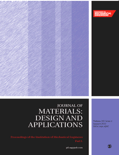
PROCEEDINGS OF THE INSTITUTION OF MECHANICAL ENGINEERS PART L-JOURNAL OF MATERIALS-DESIGN AND APPLICATIONS
Fostering Collaboration in Mechanical Engineering and Materials SciencePROCEEDINGS OF THE INSTITUTION OF MECHANICAL ENGINEERS PART L-JOURNAL OF MATERIALS-DESIGN AND APPLICATIONS is a prestigious academic journal published by SAGE PUBLICATIONS LTD, focusing on the dynamic fields of mechanical engineering and materials science. With an impressive impact factor reflective of its rigorous scholarly contributions, this journal serves as a vital platform for the dissemination of innovative research and practical applications in materials design and engineering processes. Since its inception in 1999 and continuing through 2024, it has maintained a robust reputation, achieving a Q2 ranking in both Materials Science (miscellaneous) and Mechanical Engineering categories, as well as commendable Scopus ranks that place it in the top percentiles of its fields. Located in the United Kingdom, the journal encourages submissions from researchers and professionals who are seeking to advance their understanding of materials applications while fostering interdisciplinary collaboration. Although it currently operates under traditional access terms, the journal prioritizes impactful research that addresses contemporary challenges in design and manufacturing, ensuring that it remains a must-read for anyone invested in the innovations shaping our technological landscape.
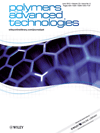
POLYMERS FOR ADVANCED TECHNOLOGIES
Pioneering New Horizons in Polymer TechnologiesPOLYMERS FOR ADVANCED TECHNOLOGIES is a premier peer-reviewed journal published by WILEY, focusing on cutting-edge research in the field of polymers and plastics. Since its inception in 1990, the journal has established itself as a critical resource for academics and industry professionals alike, reflecting advancements and innovations in polymer science and technology. With an impressive Scopus ranking of #45 out of 161 in the Materials Science category and a 72nd percentile ranking, it ranks in the Q2 quartile for its relevance and impact within the polymers field. The journal's comprehensive scope encompasses recent developments and trends in polymer applications, synthesis, and characterization, making it essential reading for researchers looking to advance their work within this dynamic area. Researchers can submit their work in the UK, where the journal is published, and while it does not currently offer open-access options, its robust impact factor highlights the significance of the research it disseminates. Join the community of experts pushing the boundaries of polymer science by engaging with POLYMERS FOR ADVANCED TECHNOLOGIES. Continuous exploration and innovation await those who contribute to and learn from the journal’s diverse array of studies.
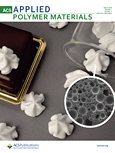
ACS Applied Polymer Materials
Elevating Knowledge in Polymer TechnologiesACS Applied Polymer Materials is a prestigious journal published by the American Chemical Society, specifically tailored for the dynamic fields of Organic Chemistry, Polymers and Plastics, and Process Chemistry and Technology. With its ISSN 2637-6105, the journal has rapidly established itself within the academic community, achieving a distinguished Q1 quartile ranking across multiple categories in 2023. This places it among the top-tier journals globally, reinforcing its critical role in disseminating groundbreaking research and innovation in polymer science. The journal is known for its rigorous peer-review process and publishes high-quality articles that are pivotal for researchers, professionals, and students eager to advance knowledge in polymer materials and their applications. Positioned to cover converging themes from 2019 through 2024, ACS Applied Polymer Materials embraces a wide scope of studies, from fundamental chemistry to practical engineering applications, thereby fostering significant advancements in material science. While it offers traditional access options, the journal's impact is reflected in its impressive rankings within Scopus, indicating its relevance and influence in the chemical engineering domain. Join the global community of innovators and discover the latest insights that continue to shape the landscape of applied polymer research.
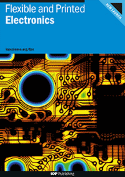
Flexible and Printed Electronics
Exploring Innovations in Printed MaterialsFlexible and Printed Electronics, published by IOP Publishing Ltd, is a leading journal dedicated to advancing the field of flexible and printed materials within the realm of electrical and electronic engineering. With an impressive Q2 ranking in both Electrical and Electronic Engineering and Electronic, Optical, and Magnetic Materials, this journal is recognized for its significant contributions to the understanding and application of innovative electronic devices and systems. Covering a wide array of topics from materials science to engineering applications, it serves as a vital resource for researchers, professionals, and students alike. The journal's rigorous peer-review process and commitment to high-quality publications ensure that readers are exposed to cutting-edge research and developments. Submissions are welcomed from global contributors, providing a platform for the dissemination of groundbreaking ideas and technologies. With its impressive impact in the academic community, Flexible and Printed Electronics is poised to influence the future of electronics and materials technology.

Advanced Materials Technologies
Pioneering Innovations in Material ScienceAdvanced Materials Technologies is a leading scholarly journal published by WILEY, dedicated to the rapidly evolving fields of materials science and engineering. With an impressive 2023 impact factor reflected in its Q1 ranking in Industrial and Manufacturing Engineering, Mechanics of Materials, and a notable position within the materials science community, this journal stands as a premier platform for disseminating innovative research and technological advances. The journal encompasses a diverse range of topics, from the fabrication and characterization of advanced materials to their applications in various industries, thus fostering interdisciplinary collaboration among researchers, professionals, and students. Since its inception in 2016 and looking forward to 2024, Advanced Materials Technologies continues to provide unparalleled access to high-quality, peer-reviewed articles, ensuring that it remains a vital resource for anyone involved in the design and optimization of advanced materials.
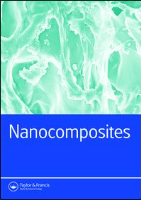
Nanocomposites
Exploring the Future of Interdisciplinary MaterialsNanocomposites, published by Taylor & Francis Ltd, is a leading open-access journal dedicated to the interdisciplinary field of nanomaterials and their applications in composites. With its ISSN 2055-0324 and E-ISSN 2055-0332, the journal has established itself as a premier platform for disseminating high-quality research since its inception in 2015. It is notable for its impressive Q1 rankings across various categories, including Ceramics and Composites, Materials Chemistry, Mechanical Engineering, and Mechanics of Materials, reflecting its significant impact on the scientific community. The journal is recognized for its rigorous peer-review process and rapid publication times, making it an essential resource for researchers and professionals seeking to advance knowledge in the synthesis, characterization, and application of nanocomposite materials. With an open access policy implemented in 2017, Nanocomposites ensures that cutting-edge research is accessible to a global audience, fostering collaboration and innovation across disciplines. Emphasizing the critical role that nanocomposites play in advancing technology, this journal invites contributions that push the boundaries of current understanding and application.